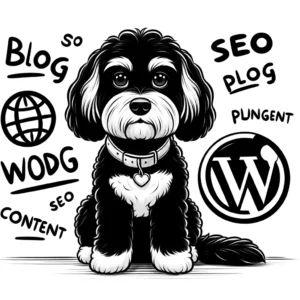Understanding SSL Certificates in WordPress
Securing WordPress sites with SSL certificates is critical for user trust and data integrity. SSL certificates encrypt data transfers, making them indispensable security measures for websites.
Basics of SSL and HTTPS
SSL, or Secure Sockets Layer, is the standard security technology responsible for creating an encrypted link between a web server and a browser. HTTPS (Hypertext Transfer Protocol Secure) emerges when SSL is used, ensuring that the data transfer between the user and the site remains secure and private.
To establish this secure connection in WordPress, an SSL certificate must be installed. When active, users see a padlock icon in their browser’s address bar, signaling that the connection is secure.
Importance of SSL Certificates for WordPress Sites
For WordPress site owners, implementing an SSL certificate is not just an optional upgrade, it’s a necessity for several reasons:
- Enhanced Security: SSL certificates protect sensitive information exchanged on a website, reducing the risk of cyber threats.
- Trust and Credibility: Websites with HTTPS are more likely to earn users’ trust, signaling that the site is legitimate and secure.
- SEO Benefits: Search engines favor secure websites, and having an SSL certificate can improve a site’s search engine ranking.
In essence, an SSL certificate is a fundamental internet protocol within WordPress, that reinforces a site’s encryption and security measures—essential in today’s digital landscape.
Implementing SSL in WordPress
Enabling SSL on a WordPress site is a multi-step process involving obtaining a certificate, modifying settings, and fixing potential issues. Proper implementation ensures secure data transmission and improved website trustworthiness.
Obtaining and Installing SSL Certificates
To secure a WordPress site with SSL (Secure Sockets Layer), one must first obtain a certificate from a Certificate Authority. Providers like Let’s Encrypt offer free SSL certificates. The installation process typically involves accessing the cPanel dashboard of the hosting provider and locating the SSL/TLS manager. Follow the instructions to upload or install the certificate, often involving pasting the public key and private key data.
Configuring WordPress for HTTPS
After installing the SSL certificate, one must configure WordPress to use HTTPS rather than HTTP. This involves:
- Changing the WordPress Address (URL) and Site Address (URL) settings to include “https” instead of “http”.
- Updating the .htaccess file to include a redirect from HTTP to HTTPS, ensuring all traffic is secure.
- Utilizing a plugin like Really Simple SSL can simplify this by handling the settings and redirects.
Troubleshooting Common SSL Issues in WordPress
Common issues after implementing SSL on WordPress include mixed content warnings, which occur when a site serves HTTP content over an HTTPS connection. Solutions involve:
- Using a plugin designed to fix mixed content by adjusting the URLs within the site’s content.
- Manually scouring the site for non-HTTPS links and scripts, which often requires coding knowledge or access via FTP to modify files directly.
- Ensuring all resources are loaded over the new protocol, involving checks on media files, theme files, and third-party integrations.
Enhancing WordPress SSL Security and Performance
Securing a WordPress site with SSL should be a priority for every website owner. Not only does it protect sensitive data, but it also boosts SEO rankings and enhances user experience.
Leveraging SSL for SEO and User Experience
Using SSL certificates on WordPress sites is critical for more than just security; it’s beneficial for Search Engine Optimization (SEO) and improving user experience. Google has confirmed that it uses HTTPS as a ranking signal. This means that sites employing SSL have an advantage in Google’s search results. Moreover, SSL certificates activate the padlock icon on a web browser, giving users a visible sign that their connection is secure. This can reduce bounce rates, as visitors are more likely to stay on a site they trust.
Furthermore, WordPress site owners should ensure a proper HTTP to HTTPS redirect to maintain SEO integrity. Using the mod_rewrite module in .htaccess or plugins can help implement 301 redirects, which are both SEO-friendly and ensure that users and search engines are directed to the secure version of the site. Mixed content errors could damage both SEO and user experience, so it is essential to correct these by ensuring that all content (like JS or CSS files) is loaded over an HTTPS connection.
Maintenance and Best Practices for SSL on WordPress Sites
Regular maintenance and adherence to best practices are necessary for optimal SSL performance on WordPress sites. Website owners should choose the right type of certificate, whether it’s a single domain, wildcard SSL certificate for multiple subdomains, or OV/EV certificates for enhanced validation. WordPress hosting companies, such as SiteGround, Hostinger, Inmotion Hosting, GreenGeeks, and Cloudways, often provide easy options for obtaining and managing SSL certificates.
WordPress owners should also keep track of the expiration date of their SSL certificates to avoid lapses in security. For enhanced performance, implementing HTTP/2, a major revision of the HTTP protocol, is recommended because it requires an SSL certificate and can speed up load times significantly. Additionally, using a Content Delivery Network (CDN) like Cloudflare can improve site speed and performance while providing an additional layer of SSL security.
Managing SSL certificates involves generating a Certificate Signing Request (CSR) and correctly installing the certificate. Once installed, continuous monitoring is advisable. This includes checking for proper encrypted communication of login credentials and other sensitive data. Frequent testing for SSL issues using tools like Google Chrome’s developer tools or Google Search Console will help site owners maintain a secure website with minimal downtime. For added security and speed, third-party services integrated with WordPress.com also offer CDN services, automatic HTTPS rewrites, and optimized SSL configurations.











